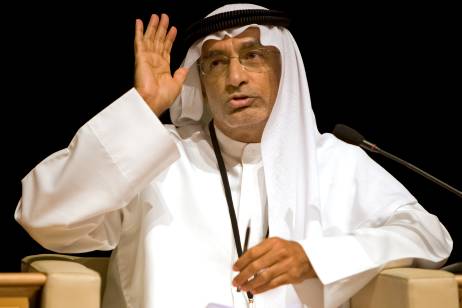On Monday, 16 January 2017, the United Arab Emirates (UAE) State Security Apparatus arrested prominent political science professor Dr. Abdulkhaleq Abdulla, detaining him for ten days before his release on Thursday, 26 January 2017. It is suspected that UAE authorities arrested him over tweets he made about free expression in the UAE. At the time of arrest, his whereabouts and the details about specific charges against him were unknown.
Considered to be one of the most prominent scholars on Gulf international relations and politics, Dr. Abdulla is currently the chair of the Arab Council for Social Science, a non-resident fellow at the Arab Gulf States Institute in Washington, and a visiting fellow at the London School of Economics and Political Science. He is a former Fulbright Scholar and visiting professor to Georgetown University, from where he also obtained his PhD. He was director of the Gulf Research Unit, Sharjah for a decade and has published numerous books and articles about the Gulf region.
UAE authorities have increasingly targeted human rights defenders and academics over the past five years. Unfair trials, enforced disappearances, and arbitrary detentions are all tactics used by UAE officials to suppress dissent. The state most recently held a hearing for another academic, economist Dr. Nasser bin Ghaith, after forcibly disappearing him for over eight months, denying him access to proper medical care while in prison, subjecting him to extended periods of solitary confinement, and restricting visits from his lawyer and family. Similar to Dr. Abdulla, UAE officials have declared several charges against Dr. bin Ghaith for comments he made on Twitter about “Arab dictators.” Authorities allege that he “committed a hostile act against a foreign state” and posted comments to “harm the reputation” of the state. The government often uses its overly-expansive 2014 counter-terrorism law and 2012 cybercrime law as the basis for justifying its attacks on human rights.
Numerous human rights organizations have expressed concern over this growing trend of restricting expression in the UAE. In this year’s World Report, Human Rights Watch highlighted the UAE government’s expansive electronic surveillance program, which it uses to target and silence critics. Freedom House has routinely labeled UAE’s press freedom as “Not Free” due to the government’s strict control over the media and internet. Although the UAE is not a signatory to the International Covenant on Civil and Political Rights (ICCPR), the government accepted a number of recommendations made in its Second Cycle Universal Periodic Review in 2013 related to enhancing protections for the freedom of expression in line with international law.
The release of Dr. Abdulkhaleq Abdulla is a positive development, but ADHRB remains concerned about his future safety, as well as that of all other academics and human rights activists in the UAE. UAE authorities should release Dr. Nasser bin Ghaith and all other prisoners of conscience and guarantee their internationally-sanctioned rights to exercise free expression and association.
Rachael Diniega is an Advocacy Intern at ADHRB.





